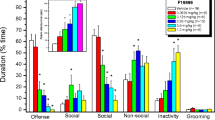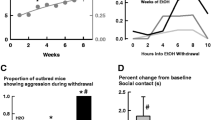Abstract
One of the critical mechanisms by which alcohol heightens aggression involves forebrain serotonin (5-HT) systems, possibly via actions on 5-HT1A receptors. The present experiments tested the hypothesis that activating 5-HT1A receptors by selective agonists will block the aggression-heightening effects of ethanol. Initially, the selective antagonist WAY 100635 was used to assess whether or not the changes in aggressive behavior after treatment with 8-OH-DPAT and flesinoxan result from action at the 5-HT1A receptors. Resident male CFW mice engaged in aggressive behavior (i.e. attack bites, sideways threats, tail rattle) during 5-min confrontations with a group-housed intruder male. Quantitative analysis of the behavioral repertoire revealed systematic reductions in all salient elements of aggressive behavior after treatment with 8-OH-DPAT (0.1–0.3 mg/kg, IP) or flesinoxan (0.1–1.0 mg/kg, IP). The 5-HT1A agonists also reduced motor activities such as walking, rearing and grooming, although to a lesser degree. Pretreatment with the antagonist WAY 100635 (0.1 mg/kg, IP) shifted the agonist dose-effect curves for behavioral effects to the right. In a further experiment, oral ethanol (1.0 g/kg, PO) increased the frequency of attacks in excess of 2 SD from their mean vehicle level of attacks in 19 out of 76 resident mice. Low doses of 8-OH-DPAT (0.03–0.3 mg/kg) and flesinoxan (0.1, 0.3, 0.6 mg/kg), given before the ethanol treatment, attenuated the alcohol-heightened aggression in a dose-dependent fashion. By contrast, these low 5-HT1A agonist doses affected motor activity in ethanol-treated resident mice to a lesser degree, suggesting behavioral specificity of these anti-aggressive effects. The current results support the hypothesized significant role of 5-HT1A receptors in the aggression-heightening effects of alcohol. If these effects are in fact due to action at somatodendritic 5-HT1A autoreceptors, then the anti-aggressive effects would be associated with decreased 5-HT neurotransmission.
Similar content being viewed by others
Author information
Authors and Affiliations
Additional information
Received: 26 January 1998/Final version: 10 March 1998
Rights and permissions
About this article
Cite this article
Miczek, K., Hussain, S. & Faccidomo, S. Alcohol-heightened aggression in mice: attenuation by 5-HT1A receptor agonists. Psychopharmacology 139, 160–168 (1998). https://doi.org/10.1007/s002130050701
Issue Date:
DOI: https://doi.org/10.1007/s002130050701




